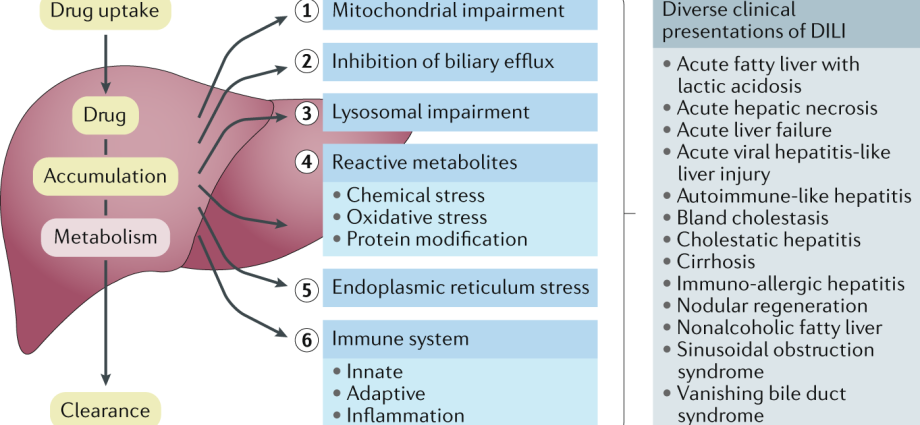Contents
What is drug-induced hepatitis
Drug-induced hepatitis is liver damage caused by drugs, both in overdose and in long-term use in therapeutic doses. The key lesion includes inflammation of the liver caused by side effects or the main effect of medications. Hepatitis can also be caused by illegal (“recreational”, narcotic, psychotropic) drugs and environmental toxins.
Causes of drug-induced hepatitis in adults
Medicines can cause liver disease in several ways. Some drugs directly harm liver cells. Others are converted by the liver into chemicals that can directly or indirectly damage the liver. It may seem strange in light of the important role of the liver in converting toxic chemicals into non-toxic chemicals, but it happens. There are three types of liver toxicity:
- dose-dependent toxicity;
- idiosyncratic toxicity;
- drug allergy.
Drugs that cause dose-dependent toxicity can cause liver disease in most people if taken in large amounts. The most important example of dose-dependent toxicity is paracetamol overdose.
Drugs that cause idiosyncratic toxicity cause disease only in those few patients who have inherited certain genes that control the chemical transformation of a particular drug. Due to the peculiarities of their metabolism, they accumulate the drug or its metabolic products (metabolites), which are harmful to the liver. These inherited idiosyncratic toxic effects are usually rare and, depending on the drug, occur in less than 1 to 10 people per 100 patients taking the drug. Although the risk of developing drug-induced idiosyncrasy is low, this liver injury is the most common form of drug-induced liver injury, with tens of millions of patients taking drugs daily, and many of them taking multiple drugs at once.
Drug allergies can also cause liver damage, although this is rare. In a drug allergy, the liver becomes inflamed because the body’s immune system attacks the drugs with antibodies and immune cells.
Symptoms of drug-induced hepatitis in adults
Typical symptoms of drug-induced hepatitis include:
- loss of appetite;
- nausea;
- vomiting;
- heat;
- fatigue and weakness;
- abdominal pain.
In more severe cases, patients may have fever, dark urine, light-colored stools, and jaundice. Patients with hepatitis usually have high blood levels of AST, ALT, and bilirubin.
Drug-induced hepatitis can be acute or chronic (more than 3 months). Both usually resolve when the drug is stopped, but sometimes acute hepatitis can be severe enough to cause acute liver failure, and chronic hepatitis can rarely lead to permanent liver damage and cirrhosis.
Medicines that can cause acute hepatitis: paracetamol, phenytoin, aspirin, isoniazid, diclofenac (Voltaren), and amoxicillin/clavulanic acid (Augmentin).
Drugs that can cause chronic hepatitis: minocycline, nitrofurantoin, phenytoin, propylthiouracil, fenofibrate, and methamphetamine (“ecstasy”).
In rare cases, drugs cause fulminant hepatitis – acute liver failure. People with this diagnosis come to the clinic with symptoms of acute hepatitis and additional problems such as confusion or coma (encephalopathy), bruising or bleeding (coagulopathy). Between 40% and 70% of people with fulminant hepatitis die. Paracetamol is the most common cause of acute liver failure in many countries.
Treatment of drug-induced hepatitis in adults
The diagnosis of drug-induced liver disease is often difficult. Patients may have no symptoms of liver disease or only mild non-specific symptoms. In addition, they may be taking multiple medications, making it difficult to determine which drug is causing the problem. They may also have other potential causes of liver disease, such as obesity and alcoholism.
Diagnostics
The diagnosis is based on the patient’s symptoms (loss of appetite, nausea, fatigue, itching, and dark urine), physical examination findings (jaundice, liver enlargement), and abnormal laboratory tests (elevated levels of liver enzymes or bilirubin in the blood and blood clotting time). If a patient has symptoms, signs, and abnormal liver tests, doctors try to find out if drugs are causing the disease. For this, a number of additional steps are carried out:
- a thorough history of alcohol use to rule out alcoholic liver disease;
- blood tests to rule out viral hepatitis B and hepatitis C, as well as to rule out chronic liver diseases such as autoimmune hepatitis and primary biliary cirrhosis;
- Abdominal ultrasound or computed tomography (CT) to rule out gallbladder disease and tumors
- a careful history of medications commonly associated with liver disease.
Modern treatments
The mainstay of treatment is stopping the drug causing the disease. In most patients, signs and symptoms will disappear, blood tests will become normal, and there will be no long-term liver damage.
However, there are exceptions. For example, paracetamol overdoses are treated with N-acetylcysteine to prevent severe necrosis and liver failure. Some patients with acute liver failure may require a liver transplant.
Prevention of drug-induced hepatitis in adults at home
It should be remembered that there are drugs that should not be taken by people with liver disease. Among them:
- Isoniazid;
- oral contraceptives;
- Androgens;
- Chlorpromazine;
- Allopurinol;
- Paracetamol;
- Hydralazine;
- Halothane;
- Valproic acid;
- Phenytoin;
- Carbamazepine;
- Methotrexate;
- 6 – mercaptopurine.
If you have a liver problem while taking medication, see your doctor – he will recommend safe medicines.
Popular questions and answers
We asked a number of questions about drug-induced liver injury gastroenterologist Marat Zinnatullin.
● nausea, vomiting;
● stool disorder;
● general malaise and weakness;
● pain and heaviness in the right hypochondrium;
● jaundice;
● skin itching;
● an increase in the size of the liver and spleen.










